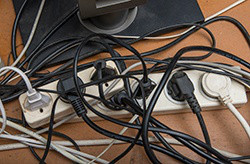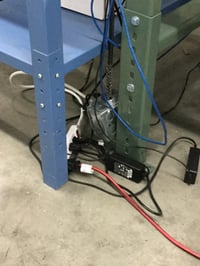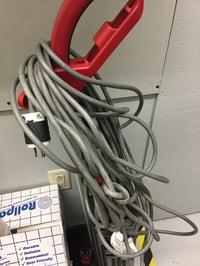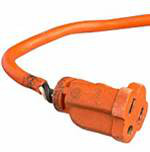 Office environments are full of electronics, appliance, power cords, extension cords, and surge protectors. Take a look at your desk. I’m guessing you have several items just in your personal workspace, let alone the entire office.
Office environments are full of electronics, appliance, power cords, extension cords, and surge protectors. Take a look at your desk. I’m guessing you have several items just in your personal workspace, let alone the entire office.
These items have become such an integral part of our work that we don’t necessarily give too much thought to the hazards they bring with them. Electrical shock, burns, fires, and even tripping over extension cords. Electricity creates numerous hazards to your employees and your facility.
Most electrical accidents result from unsafe equipment or installation, unsafe environment, or unsafe work practices. So what can you do to help prevent electrical hazards in your office? Consider the following tips:
Do Not Overload Outlets And Circuits
 Do not overload outlets and circuits. Even if you are using a surge protector, that doesn’t protect you from the potential dangers of an overload circuit. If your surge protector or ground-fault circuit interrupter (GFCI) is constantly resetting or your breaker keeps tripping - you are overloading your circuit!
Do not overload outlets and circuits. Even if you are using a surge protector, that doesn’t protect you from the potential dangers of an overload circuit. If your surge protector or ground-fault circuit interrupter (GFCI) is constantly resetting or your breaker keeps tripping - you are overloading your circuit!
In most homes and offices, a circuit is 15-20 amps. Now consider the amperage of items you might find in the office – refrigerator (5-8 amps), space heater (8-13 amps), toaster (7-10 amps), coffeemaker (5-8 amps), laptop (2-3 amps). Plugging a few of these devices into one outlet could easily overload a circuit! They can heat the wires to a very high temperature, creating potential fire hazards and risks of electrical shock. So be aware of what your circuits can handle. Don’t plug more than one high-wattage device into an outlet. Don’t plug multi-outlet bars or surge protector into other ones.
Use Care With Cords
 There are likely power cords and extension cords throughout your office. If not properly maintained, placed, or utilized they can create significant electrical hazards.
There are likely power cords and extension cords throughout your office. If not properly maintained, placed, or utilized they can create significant electrical hazards.
- Do not plug two extension cords together. If you find that too many extension cords are in use – consider having a licensed electrician install additional outlets.
- Make sure cords are properly placed. Don’t fasten cords with staples, hang from nails, or suspend them with a wire. Don’t cover them with rugs or mats. Don’t place them on radiators, steam pipes, or windows.
- Do not run cords through high-traffic areas, walkways, or across doorways where they would pose a potential tripping hazard. If you must run a cord across a walkway, be sure to use a cord runner or tape it down with industrial tape.
 Use care with storing cords. They should not be tied in knots. These knots can cause short circuits in the broken wire underneath the insulating jackets and result in electrical shock.
Use care with storing cords. They should not be tied in knots. These knots can cause short circuits in the broken wire underneath the insulating jackets and result in electrical shock.- When unplugging devices, be sure to use a firm grip and pull the plug itself – do NOT pull the plug out by its cord.
- Inspect cords regularly. Look for frayed, cracked, or damaged cords. If defects are found, replace them immediately.
Additional Electrical Safety Tips
- Only use equipment that is certified by a national testing laboratory such as UL, CSA, or ETL. Make sure you are using devices and cords for their intended use – office or home use vs. manufacturing use, indoor or outdoor, specific power limits, etc.
- Don’t use electrical equipment or appliances when your hands or the equipment are wet. And don’t use them near wet surfaces or water.
- GFCI should be installed near sinks and any wet environment such as a water cooler, restroom, or garage. They’re there to detect a ground fault within the circuit or the device being utilized, but they are also a warning device. If you constantly have to reset the GFCI, then you are overloading your circuit.
- Make sure any exposed wires or electrical components are properly covered or guarded.
- Unplug appliances when not in use to conserve energy and to reduce the opportunities for electric fire or shock. Unplug or disconnect machines before any service or repairs.
- Pay attention for the warning signs. If an items gives off a strange odor, makes an unusual noise, feels hot, smokes, or sparks – disconnect it immediately.
Resources
- Our Preventing Electrical Accidents blog takes a look at the regulations regarding electrical safety in the workforce and ways to keep your people protected.
- Many of the tips in our Electrical Safety At Home blog can also apply to the office environment.
- Electrical Safety Foundation has numerous resources related to electrical safety in the home and the workplace.
- Visit the OSHA website for helpful information, tools, and training materials.



